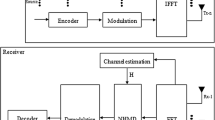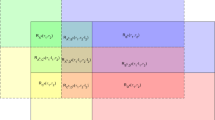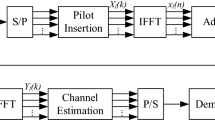Abstract
In this paper, we investigate the robust precoding and beamforming design problem for orthogonal space–time block code (OSTBC) based cognitive radio amplify-and-forward multiple-input–multiple-output relay systems with simultaneous wireless information and power transfer which consists of a primary receiver, a secondary source, a secondary relay, a secondary destination and an energy harvesting receiver. The secondary source and the secondary relay employ OSTBC based precoding and beamforming. The secondary relay and the secondary destination employ maximum-ratio combining for signal detecting and decoding. Our objective is to maximize the worst-case achievable rate under the sum transmit power constraint, the worst-case sum harvested power constraint and the worst-case interference power constraint. We transform the objective function into a convex function and convert the semi-infinite constraints into linear matrix inequalities by using \({\mathcal {S}}\)-Lemma and the extension of \({\mathcal {S}}\)-Lemma. Simulation results demonstrate that our proposed robust precoding and beamforming design has significant performance gain over the non-robust one.


Similar content being viewed by others
References
Mitola, J., & Maguire, G. Q. (1999). Cognitive radios: Making software radios more personal. IEEE Personal Communications, 6(4), 13–18.
Haykin, S. (2005). Cognitive radio: Brain-empowered wireless communications. IEEE Journal on Selected Areas in Communications, 23(2), 201–220.
Zhang, L., Liang, Y.-C., Xin, Y., & Poor, H. V. (2009). Robust cognitive beamforming with partial channel state information. IEEE Transactions on Wireless Communications, 8(8), 4143–4153.
Gharavol, E. A., Liang, Y.-C., & Mouthaan, K. (2010). Robust downlink beamforming in multiuser MISO cognitive radio networks with imperfect channel-state information. IEEE Transactions on Vehicular Technology, 59(6), 2852–2860.
Zhang, R., & Ho, C. K. (2013). MIMO broadcasting for simultaneous wireless information and power transfer. IEEE Transactions on Wireless Communications, 12(5), 1989–2001.
Xiang, Z., & Tao, M. (2012). Robust beamforming for wireless information and power transmission. IEEE Wireless Communications Letter, 1(4), 372–375.
Liu, L., Zhang, R., & Chua, K. C. (2014). Secrecy wireless information and power transfer with MISO beamforming. IEEE Transactions on Signal Processing, 62(7), 1850–1863.
Chalise, B. K., Wing-Kin, M., Zhang, Y. D., Suraweera, H. A., & Amin, M. G. (2013). Optimum performance boundaries of OSTBC based AF-MIMO relay system with energy harvesting receiver. IEEE Transactions on Signal Processing, 61(17), 4199–4213.
Tarokh, V., Jafharkani, H., & Calderbank, A. R. (1999). Space–time block codes from orthogonal designs. IEEE Transactions on Information Theory, 45(5), 1456–1467.
Alamouti, S. M. (1998). A simple transmit diversity technique for wireless communications. IEEE Journal on Selected Areas in Communications, 16(8), 1452–1458.
Hjörugnes., A., & Gesbert, D. (2007). Precoding of orthogonal-space time bolck codes in arbitrarily correlated MIMO channels: Iterative and closed-form solutions. IEEE Transactions on Wireless Communications, 6(3), 1072–1082.
Kyung, S. A., & Heath, R. W. (2009). Performance analysis of maximum ratio combining with imperfect channel estimation in thepresence of cochannel interferences. IEEE Transactions on Wireless Communications, 8(3), 1080–1085.
Luo, Z.-Q., Ma, W.-K., So, A. M.-C., Ye, Y., & Zhang, S. (2010). Semidefinite relaxation of quadratic optimization problems: From its practical deployments and scope of applicability to key theoretical results. IEEE Signal Processing Magazine (Special Issue on Convex Optimization for Signal Processing), 27(3), 20–34.
Huang, Y., & Palomar, D. P. (2010). Rank-constrained separable semidefinite programming with applications to optimal beamforming. IEEE Transactions on Signal Processing, 58(2), 664–678.
Beck, A., & Eldar, Y. C. (2006). Strong duality in nonconvex quadratic optimization with two quadratic constraints. SIAM Journal on Optimization, 17(3), 844–860.
Luo, Z.-Q., Sturn, J. F., & Zhang, S. (2004). Multivariate nonnegative quadratic mappings. SIAM Journal on Optimization, 14, 1140–1162.
Boyd, S., & Vandenberghe, L. (2004). Convex Optimization. Cambridge: Cambridge University Press.
Polik, I., & Terlaky, T. (2010). Interior point methods for nonlinear optimization. In G. Di Pillo & F. Schoen (Eds.), Nonlinear Optimization (1st ed.). Berlin: Springer.
Acknowledgments
This work was supported in part by the National Natural Science Foundation of China under Grants 61472458, 61202498, and 61173148, in part by Guangdong Natural Science Foundation under Grants 2014A030311032 and 2014A030313111, and in part by the Fundamental Research Funds for the Central Universities under Grant 15lgzd10.
Author information
Authors and Affiliations
Corresponding author
Rights and permissions
About this article
Cite this article
Wang, B., Zhang, Q. & Qin, J. Robust Precoding and Beamforming Design of OSTBC Based CR AF-MIMO Relay System with Energy Harvesting Receiver. Wireless Pers Commun 85, 1153–1165 (2015). https://doi.org/10.1007/s11277-015-2832-1
Published:
Issue Date:
DOI: https://doi.org/10.1007/s11277-015-2832-1




